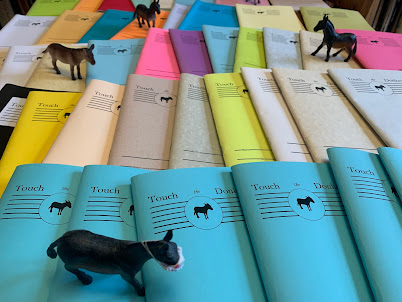Jordan Davis’s books include Shell Game (2017), Noise (2023) and Yeah, No (2023); he has edited several publications including The Poetry Project Newsletter, The Hat, Teachers & Writers, The Collected Fiction of Kenneth Koch, The Collected Poems of Kenneth Koch, the Apple iOS journal Ladowich, CCCP Chapbooks, several titles for Subpress Collective, and most recently a monthly publishing poetry on “Jewish-ish themes,” The Nu Review. He is also a former poetry editor of The Nation.
An excerpt from his “the book of how’s that going to work” appears in the forty-fifth issue of Touch the Donkey.
Q: Tell me about the work-in-progress “the book of how’s that going to work.”
A: I’ve had this notebook since the early 90s, absurdly thick cover, banana paper with threads and dirt-like imperfections in the surface, the absolute opposite of something too nice to write in, but not junk either, and I’ve carried it to five or six different homes thinking “someday I’ll know what to do with this.” That didn’t happen, so I wrote every wrong thing I could think of.
Q: How do these poems compare with some of the other work you’ve been doing lately?
A: These poems exist, which is a significant difference.
Q: Is utilizing the notebook the usual way your poems, and your projects, begin? How do poems move from notebook to completed?
A: It is. I get to the end of the notebook, and then I see what’s there.
Q: Do you see a difference in how poems emerge through working the notebook, versus any other process? And what other processes might you use to compose work?
A: Every notebook does act on my brain like a specific kind of container, and what I find congenial at one time may turn out later to be too confining or too expansive. Time is the real constraint — I use what I can find when the time emerges. Index cards… let’s talk about that another time.
Q: Did the shapes of your notebook pages inform the shapes of your poems? I’m thinking of those long, thin poems by William Carlos Williams, as he composed first drafts on his prescription pads.
A: These poems, yes. I want the work to be shapely but it’s the shape of the mental object I care about — the pathway of the experience of the poem. Other poems, the notebook acts more as a collecting plate, a radio telescope.
Q: With a handful of published books and chapbooks under your belt, how do you feel your work has developed? Where do you see your work headed?
A: I go where the thing I have to say is, but I haven’t liked to go where the things I dislike are. I’ll probably have to wade into what I dislike now. And there’s so much to dislike.
Q: I’m curious as to what some of that “wading into what you dislike” might look like, and what the process and results might be. Should I even ask?
A: I see a lot of a willed kind of poetry — self-seeking, self-mythologizing… often pretty but in a way you see coming. It clearly serves a need, but at the expense of deeper needs, in my opinion.
Q: Finally, who do you read to reenergize your own work? What particular works can’t you help but return to?
A: Poetry, if it’s any good at all, is for rereading. I’ve been rereading Kenneth Koch; it was just his centenary (February 27). I find something new every time I read him. For me, editing books and chapbooks by other poets is a form of rereading that helps me see what I want better. What renews my love of poetry, or rather, what gives me the feeling I enjoy most, is to find new poets I want to reread.
__________________________________________________________________________________________________________________________
__________________________________________________________________________________________________________________________
__________________________________________________________________________________________________________________________
__________________________________________________________________________________________________________________________
__________________________________________________________________________________________________________________________
__________________________________________________________________________________________________________________________
__________________________________________________________________________________________________________________________
Subscribe to:
Post Comments (Atom)

No comments:
Post a Comment
Note: Only a member of this blog may post a comment.